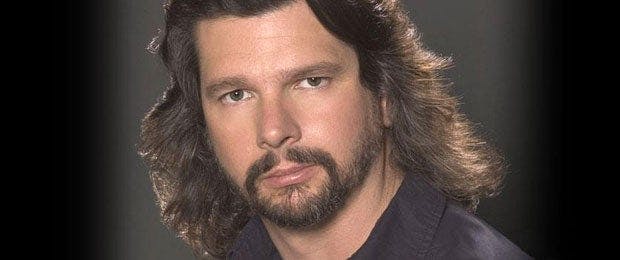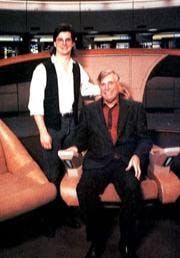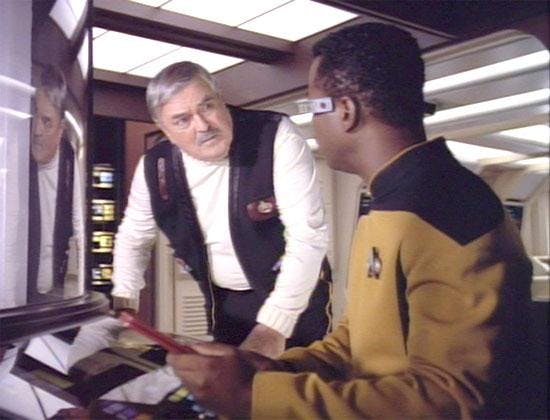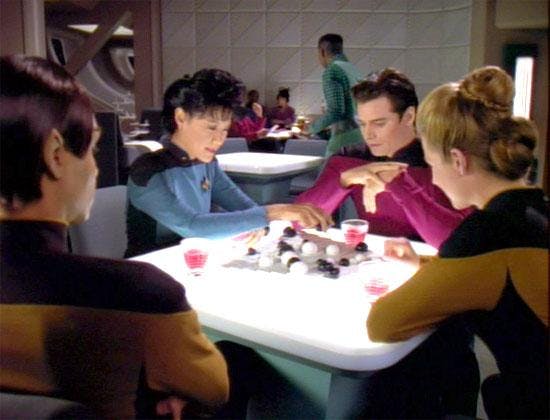Published Apr 2, 2013
You Ask The Q's, Ronald D. Moore Answers, Part 1
You Ask The Q's, Ronald D. Moore Answers, Part 1


Ronald D. Moore has been out of the Star Trek game for a long time, but it’s a game he loved and remains thrilled to have been associated with, and he won’t rule out returning to it one day. Moore, as most fans know, wrote and/or produced The Next Generation, Deep Space Nine and, briefly, Voyager, as well as the features Generations and First Contact. Post-Star Trek, Moore struck gold with the re-imagining of Battlestar Galactica and also worked on Caprica and Virtuality. He just signed a deal to executive produce a new series entitled Helix. Moore is about to get busy with Helix, but followed through on his promise to StarTrek.com to answer Trek questions posed mostly by you, the readers. So, below is part one of our interview, and be sure to visit StarTrek.com again tomorrow to read part two.We've got a few questions to start things and then 15 from the fans themselves. How amazed are you that people are still interested in your work and your experiences, some of which date back nearly 25 years now?Moore:Star Trek, to me, was always Kirk and Spock and those guys. On an inner level, Star Trek was always bigger than what I did. And it’s really amazing now to meet people and talk to people who loved the shows I worked on and the stories that I participated in. They want to hear tales about Patrick Stewart. They want to know what it was like to work on the Paramount, things that were just part of my commonplace existence. It’s gratifying. It’s great. It’s really, really nice to remember and share and look back at it from this kind of distance.Many fans wrote variations of this question: Of all the episodes and films you wrote for Trek, which ONE are you most proud to have your name on? And why that episode or movie?Moore: Wow, that’s kind of hard, and my answer to that varies a lot. Looking back, I sometimes forget some of the ones I’m tickled by. But I go back again and again to “Tapestry” and also to “All Good Things…” “Tapestry” meant a lot to me personally. I was sort of telling a story of my own views and things that I felt were profound mistakes of judgment that then later turned out to be the very events that allowed me to go work on Star Trek. So that was very personal to me. And “All Good Things…” turned out like a dream, and it was such a great, wonderful ending to the show. I remain very, very proud of that. But there’s a lot I’m proud of. My son is 14 and I’ve been showing him Star Trek, and I’ve got him up to Next Generation. As he’s going through seasons and asking about episodes, I’m going online and looking up the episodes again. I keep going, “Oh, I haven’t thought about ‘Relics’ in ages" or "I haven’t thought about…" I get to another one and think, “Oh God, I love that episode.”

Syfy just announced that Helix is green lit as a series, not just a pilot, and that it will debut this year. How excited are you to get a new show on the air, and how does it change things to know you have 13 episodes and it's not all riding on the pilot?Moore: I’m very excited. It’s great to have a show on the air. It’s all about getting stuff on the air. I hate the pilot business. Everybody in this town hates the pilot business. It’s nice to see that it’s starting to go away bit by bit because it’s just a bad business to be in. It’s a tremendous amount of effort, a tremendous amount of energy and money that ultimately is wasted, and it doesn’t seem to improve the process, doing a pilot first. So just going to series is really great. That’s becoming a more common thing and you’re seeing more networks do it – because it just makes sense. Instead of spending all this money on one atypical episode and then trying to judge it, they sort of buy in on the concept and maybe the pilot script and then order the whole series. It costs everybody involved a lot less and everyone is much satisfied being in the business of making television episodes instead of just playing the numbers game in the pilot business. So it’s a positive trend and hopefully more and more networks will start doing this.When will casting and then production begin?Moore: We’re ramping up into both. Steve Maeda is going to be the day-to-day showrunner. I’m supervising this project as an executive producer. It’s a script written by another writer, developed at Sony, and they brought it to me. I really liked it, and then we took it to Syfy and said, “Here’s the outline of what the first season would be like. Here’s our vision for the show,” and on that basis they green lit it. We then reached out to Steve to run it day to day while I develop various other projects. I’m developing a series called Outlander for Starz, which is based on a series of books by Diana Gabaldon. The idea would be to do a season a book, and she’s done seven or eight books at this point. It’s sort of a big adventure period piece with a romance at the heart of it. If all goes well, they’d also go straight to series and not do a pilot first. So, we’re hopeful. OK, let’s switch to the fan questions. Josh Lee wrote: I want to know if he misses Star Trek on TV, both as a fan and as a very creative voice?Moore: I do. I think that Star Trek, in its DNA, is a television show. The features are great. They’re a lot of fun and they’ve certainly opened it up to a lot of different audiences, but the features all are basically atypical episodes, if you think about it. The features are very big action-adventure movies, lots of spectacle, run and jump, shoot-em-up and blowing things up. The fate of the Earth, or the universe itself, is always at stake. It’s always about the captain, and one other character has a strong B-story, and everyone else sort of has very small roles beyond that. But Star Trek, as originally conceived, and as you saw play out in all the other series, was really a morality play every week, and it was about an ensemble of players. They were exploring science fiction ideas, sociological ideas and moral ideas. That’s really what the shows are about, and the movies are just pitched in a different way and at a different audience. The movies will do a story where the captain is split in two by a transporter accident and one half is evil and one half is good, and the whole story is about where does the nature of a man’s strength come from? What makes a man a man? Is it his good side? His bad side? Or how the two come together to make something greater than the sum of its parts? The movies will never do that. They’ll never do a day-in-the-life story with Data or something like “Lower Decks,” where you go explore the other characters. They’ll never do all the things that all of us who are fans fell in love with this franchise for. So I think, at some point, Star Trek will return to television, and that would be great. I’d love to watch the weekly adventures again just because it gives you an opportunity to explore lots of other things besides the action-adventure component.

David Di Troia asks: Apart from being more expensive to produce, why do you think sci-fi has such a stigma in the eyes of network executives? Do you think the days of 20ish episodes per season are over?Moore: Well, the episode orders really vary depending on the perception of the network and the show’s viability. Science fiction pieces typically have a lot of heavy post and visual effects, which makes it hard to do that many episodes a season. But, you know, on a successful piece they’ll order as many episodes as they can get. In terms of its perceptions, science fiction as a genre has a very checkered history on broadcast network television. There really aren’t that many successful models. Even the original Star Trek series, which ran three seasons, was generally considered a failure when it ran in the 60s, even though the ratings it got then, people would kill for now. There have been various attempts over the years to do a space opera, hardware-oriented, futuristic, flying-around-in-spaceship shows, and none of them have really succeeded. The ones that have succeeded are things that looked much more like contemporary society, with a little bit of sci-fi sprinkled in. The X-Files was very successful. Fringe did well. But these are shows that take place in our world and have sci-fi around the edge, per se. That’s probably too strong, but the sci-fi is not dramatized by people getting in spaceships and flying around, which is really Star Trek’s and Star Wars’ stock in trade. And the networks have just not been able to put that on the air successfully.Dino Monzon wants to know: Why weren't any DS9 characters used in First Contact? Having Capt. Sisko on hand would’ve been cool as he also had a history with the Borg, and perhaps the Prophets could've intervened during the Borg invasion of the Federation.Moore: I think we talked about having Quark in it at one point, but that didn’t work out. I don’t remember the reasons why it didn’t happen. I think it was budget or schedule, and it kind of went by the boards. Technically speaking, Worf was a Deep Space Nine character at that point, and so was the Defiant, and they were in the film. But I think there was a bigger strategic choice that was made above my head and Brannon’s to not cross-pollinate too many of the Star Trek franchises. They kind of wanted them to have their own fan bases and integrity. I think they were also trying to make First Contact as friendly to the first-time Trekkie as possible and there was probably a feeling that once you start bringing in characters from other franchises, you really have to explain it and do more backstory.Tracy Tobias wonders, Do you get sick of fans accusing you of "Killing Kirk?”Moore: (Laughs) Actually, no one has said that to me in a really, really long time.

Check back tomorrow to read part two of our interview with Ronald D. Moore.

